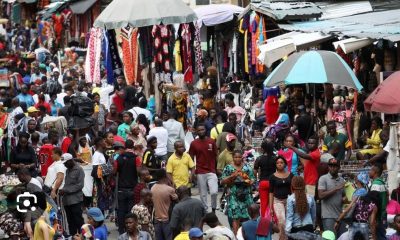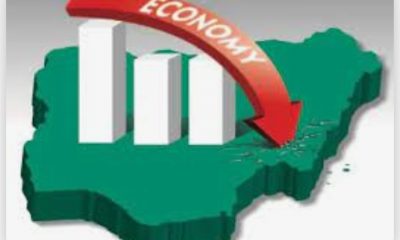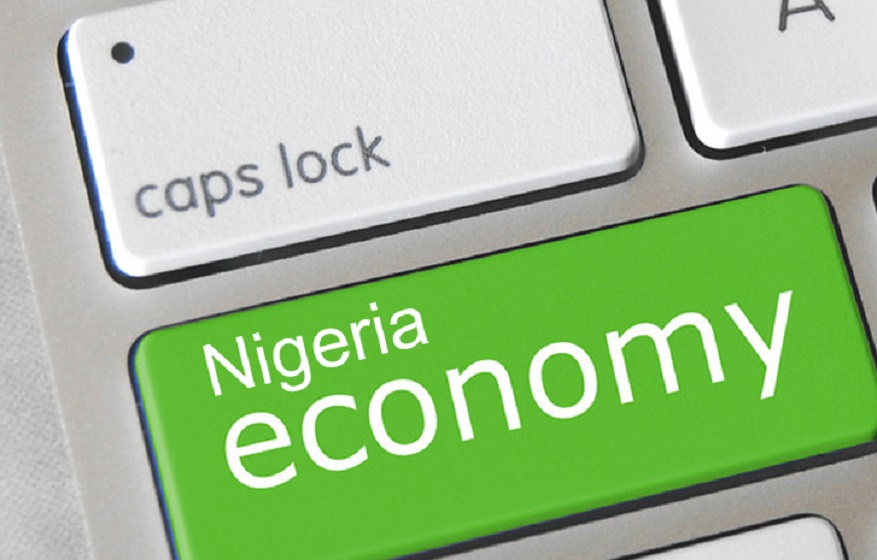Economy
World Bank Forecasts 3.4% Growth for Nigeria in 2022

By Adedapo Adesanya
Nigeria’s economy has been forecast to grow by 3.4 per cent this year by the World Bank in its latest outlook for global economies. This is in comparison to 3.6 per cent recorded in 2021.
The global lender noted that the growth in Sub-Saharan Africa (SSA), which Nigeria falls into, has weakened this year as domestic price pressures, partly induced by supply disruptions owing to the war in Ukraine, are reducing food affordability and real incomes, especially in low-income countries (LICs).
Generally, the region rebounded last year by 4.2 per cent in 2021 but the silver lining is that limited direct trade and financial linkages with Europe and Central Asia have helped contain some of the negative effects of the war in Ukraine on SSA.
In the report published on Tuesday, it was revealed that the sharp deceleration of global growth and war-related shortages of food and fuel are creating substantial headwinds for the region, even more so in countries reliant on wheat imports from Russia and Ukraine (Democratic Republic of Congo, Ethiopia, Madagascar, Tanzania).
In many SSA countries, increasing living costs have also tempered gains from looser social restrictions and higher commodity export prices.
The global lender noted that growth in the three largest SSA economies—Angola, Nigeria, and South Africa—was an estimated 3.8 per cent in 2021 supported by the 4.9 per cent rebound in South Africa.
For this year, growth in SSA is expected at 3.7 per cent in 2022 and 3.8 per cent in 2023 – on par with January projections.
Yet, excluding the three largest economies, growth was downgraded by 0.4 percentage points both in 2022 and 2023.
Although, elevated commodity prices would underpin recoveries in extractive sectors, in many countries rising inflation would erode real incomes, depress demand, and deepen poverty.
Growth momentum carried on in Angola and Nigeria, where high oil prices, the stabilization of oil production, and recovery in non-resource sectors supported activity in the first half of this year. Nevertheless, persistently high domestic inflation, power cuts, and shortages of food and fuel have been weighing on recoveries.
In South Africa, growth has moderated substantially amid policy tightening, high and rising unemployment, and recurring power shortages.
The World Bank also painted that infrastructure damage to the country’s main port following severe floods has also exacerbated supply chain disruptions related to the war in Ukraine and lockdowns in China.
Elsewhere in the region, the boost from a waning of the pandemic and a gradual rebound in tourism is being muted by rapidly rising living costs and weakening domestic demand.
In some countries, debt distress, policy uncertainty, social unrest, and violence still hamper recoveries, especially in fragile and conflict-affected LICs.
For 2022, growth in LICs was revised down by almost a full percentage point this year as food price inflation and food shortages are expected to take a particularly severe toll on vulnerable populations, further worsening food insecurity in those countries.
The growth slowdown in SSA could also intensify pandemic-induced losses in per capita incomes. The region is now expected to remain the only Emerging Market and Developing Economy (EMDE) region where per capita incomes will not return to their 2019 levels even in 2023.
In about 45 per cent of the region’s economies and in half of its fragile and conflict-affected countries, per capita incomes are forecast to remain below pre-pandemic levels next year.
Surging food and fuel import bills could also reverse recent progress in poverty alleviation across the region, especially in countries where vulnerable populations are sizable (Democratic Republic of Congo and Nigeria), and dependence on imported food is high (Benin, Comoros, The Gambia and Mozambique).
Looking at the risks, the outlook is predominantly to the downside with prolonged disruption to global trade in cereals and fertilizer due to the war in Ukraine set to significantly worsen affordability and availability of staple foods across the region.
In addition, insecurity and violence pose a threat to the outlook, especially in LICs, while rapid increases in living costs risk escalating social unrest.
A faster-than-expected slowdown of the global economy, which could be triggered by the accelerated policy tightening in advanced economies and the global resurgence of the COVID-19, would hurt many SSA commodity exporters.
The Washington-based bank warned that persistent domestic inflation could speed up monetary policy tightening, escalating stagflation risks across the region.
Economy
Tinubu Okays Extension of Ban on Raw Shea Nut Export by One Year

By Aduragbemi Omiyale
The ban on the export of raw shea nuts from Nigeria has been extended by one year by President Bola Tinubu.
A statement from the Special Adviser to the President on Information and Strategy, Mr Bayo Onanuga, on Wednesday disclosed that the ban is now till February 25, 2027.
It was emphasised that this decision underscores the administration’s commitment to advancing industrial development, strengthening domestic value addition, and supporting the objectives of the Renewed Hope Agenda.
The ban aims to deepen processing capacity within Nigeria, enhance livelihoods in shea-producing communities, and promote the growth of Nigerian exports anchored on value-added products, the statement noted.
To further these objectives, President Tinubu has authorised the two Ministers of the Federal Ministry of Industry, Trade and Investment, and the Presidential Food Security Coordination Unit (PFSCU), to coordinate the implementation of a unified, evidence-based national framework that aligns industrialisation, trade, and investment priorities across the shea nut value chain.
He also approved the adoption of an export framework established by the Nigerian Commodity Exchange (NCX) and the withdrawal of all waivers allowing the direct export of raw shea nuts.
The President directed that any excess supply of raw shea nuts should be exported exclusively through the NCX framework, in accordance with the approved guidelines.
Additionally, he directed the Federal Ministry of Finance to provide access to a dedicated NESS Support Window to enable the Federal Ministry of Industry, Trade and Investment to pilot a Livelihood Finance Mechanism to strengthen production and processing capacity.
Shea nuts, the oil-rich fruits from the shea tree common in the Savanna belt of Nigeria, are the raw material for shea butter, renowned for its moisturising, anti-inflammatory, and antioxidant properties. The extracted butter is a principal ingredient in cosmetics for skin and hair, as well as in edible cooking oil. The Federal Government encourages processing shea nuts into butter locally, as butter fetches between 10 and 20 times the price of the raw nuts.
The federal government said it remains committed to policies that promote inclusive growth, local manufacturing and position Nigeria as a competitive participant in global agricultural value chains.
Economy
NASD Bourse Rebounds as Unlisted Security Index Rises 1.27%

By Adedapo Adesanya
The NASD Over-the-Counter (OTC) Securities Exchange expanded for the first session this week by 1.27 per cent on Wednesday, February 25.
This lifted the NASD Unlisted Security Index (NSI) above 4,000 points, with a 50.45-point addition to close at 4,025.25 points compared with the previous day’s 3,974.80 points, as the market capitalisation added N30.19 billion to close at N2.408 trillion versus Tuesday’s N2.378 trillion.
At the trading session, FrieslandCampina Wamco Nigeria Plc grew by N5.00 to trade at N100.00 per share compared with the previous day’s N95.00 per share, Central Securities Clearing System (CSCS) Plc improved by N4.18 to sell at N70.00 per unit versus N65.82 per unit, and First Trust Mortgage Bank Plc increased by 14 Kobo to trade at N1.59 per share compared with the previous day’s N1.45 per share.
However, the share price of Geo-Fluids Plc depreciated by 27 Kobo at midweek to close at N3.27 per unit, in contrast to the N3.30 per unit it was transacted a day earlier.
At the midweek session, the volume of securities went down by 25.3 per cent to 8.7 million units from 11.6 million units, the value of securities decreased by 92.5 per cent to N80.7 million from N1.2 billion, and the number of deals slipped by 33.3 per cent to 32 deals from the preceding session’s 48 deals.
At the close of business, CSCS Plc remained the most traded stock by value on a year-to-date basis with 34.1 million units exchanged for N2.0 billion, trailed by Okitipupa Plc with 6.3 million units traded for N1.1 billion, and Geo-Fluids Plc with 122.0 million units valued at N478.0 million.
Resourcery Plc ended the trading session as the most traded stock by volume on a year-to-date basis with 1.05 billion units valued at N408.7 million, followed by Geo-Fluids Plc with 122.0 million units sold for N478.0 million, and CSCS Plc with 34.1 million units worth N2.0 billion.
Economy
Investors Lose N73bn as Bears Tighten Grip on Stock Exchange

By Dipo Olowookere
The bears consolidated their dominance on the Nigerian Exchange (NGX) Limited on Wednesday, inflicting an additional 0.09 per cent cut on the market.
At midweek, the market capitalisation of the domestic stock exchange went down by N73 billion to N124.754 trillion from the preceding day’s N124.827 trillion, and the All-Share Index (ASI) slipped by 114.32 points to 194,370.20 points from 194,484.52 points.
A look at the sectoral performance showed that only the consumer goods index closed in green, gaining 1.19 per cent due to buying pressure.
However, sustained profit-taking weakened the insurance space by 3.79 per cent, the banking index slumped by 2.07 per cent, the energy counter went down by 0.24 per cent, and the industrial goods sector shrank by 0.22 per cent.
Business Post reports that 25 equities ended on the gainers’ chart, and 54 equities finished on the losers’ table, representing a negative market breadth index and weak investor sentiment.
RT Briscoe lost 10.00 per cent to sell for N10.35, ABC Transport crashed by 10.00 per cent to N6.75, SAHCO depreciated by 9.98 per cent to N139.35, Haldane McCall gave up 9.93 per cent to trade at N3.99, and Vitafoam Nigeria decreased by 9.93 per cent to N112.50.
Conversely, Jaiz Bank gained 9.95 per cent to settle at N14.03, Okomu Oil appreciated by 9.93 per cent to N1,765.00, Trans-nationwide Express chalked up 9.77 per cent to close at N2.36, Fortis Global Insurance moved up by 9.72 per cent to 79 Kobo, and Champion Breweries rose by 5.39 per cent to N17.60.
Yesterday, 1.4 billion shares worth N46.2 billion were transacted in 70,222 deals compared with the 1.1 billion shares valued at N53.4 billion traded in 72,218 deals a day earlier, implying a rise in the trading volume by 27.27 per cent, and a decline in the trading value and number of deals by 13.48 per cent and 2.76 per cent, respectively.
Fortis Global Insurance ended the session as the busiest stock after trading 193.7 million units for N152.7 million, Zenith Bank transacted 120.7 million units worth N11.1 billion, Japaul exchanged 114.8 million units valued at N407.0 million, Ellah Lakes sold 98.4 million units worth N999.2 million, and Access Holdings traded 63.1 million units valued at N1.7 billion.
-

 Feature/OPED6 years ago
Feature/OPED6 years agoDavos was Different this year
-
Travel/Tourism10 years ago
Lagos Seals Western Lodge Hotel In Ikorodu
-

 Showbiz3 years ago
Showbiz3 years agoEstranged Lover Releases Videos of Empress Njamah Bathing
-

 Banking8 years ago
Banking8 years agoSort Codes of GTBank Branches in Nigeria
-

 Economy3 years ago
Economy3 years agoSubsidy Removal: CNG at N130 Per Litre Cheaper Than Petrol—IPMAN
-

 Banking3 years ago
Banking3 years agoSort Codes of UBA Branches in Nigeria
-

 Banking3 years ago
Banking3 years agoFirst Bank Announces Planned Downtime
-

 Sports3 years ago
Sports3 years agoHighest Paid Nigerian Footballer – How Much Do Nigerian Footballers Earn




















